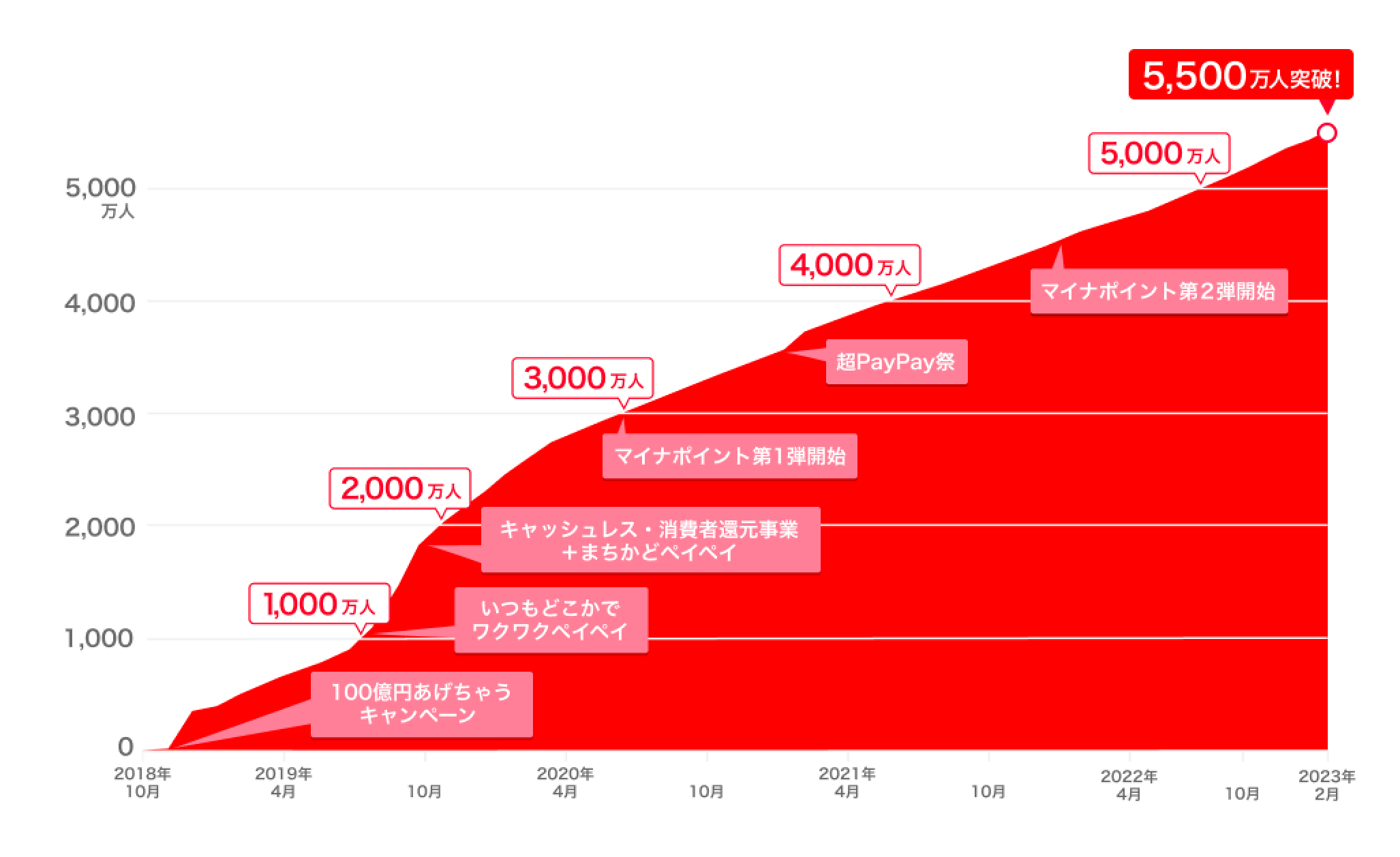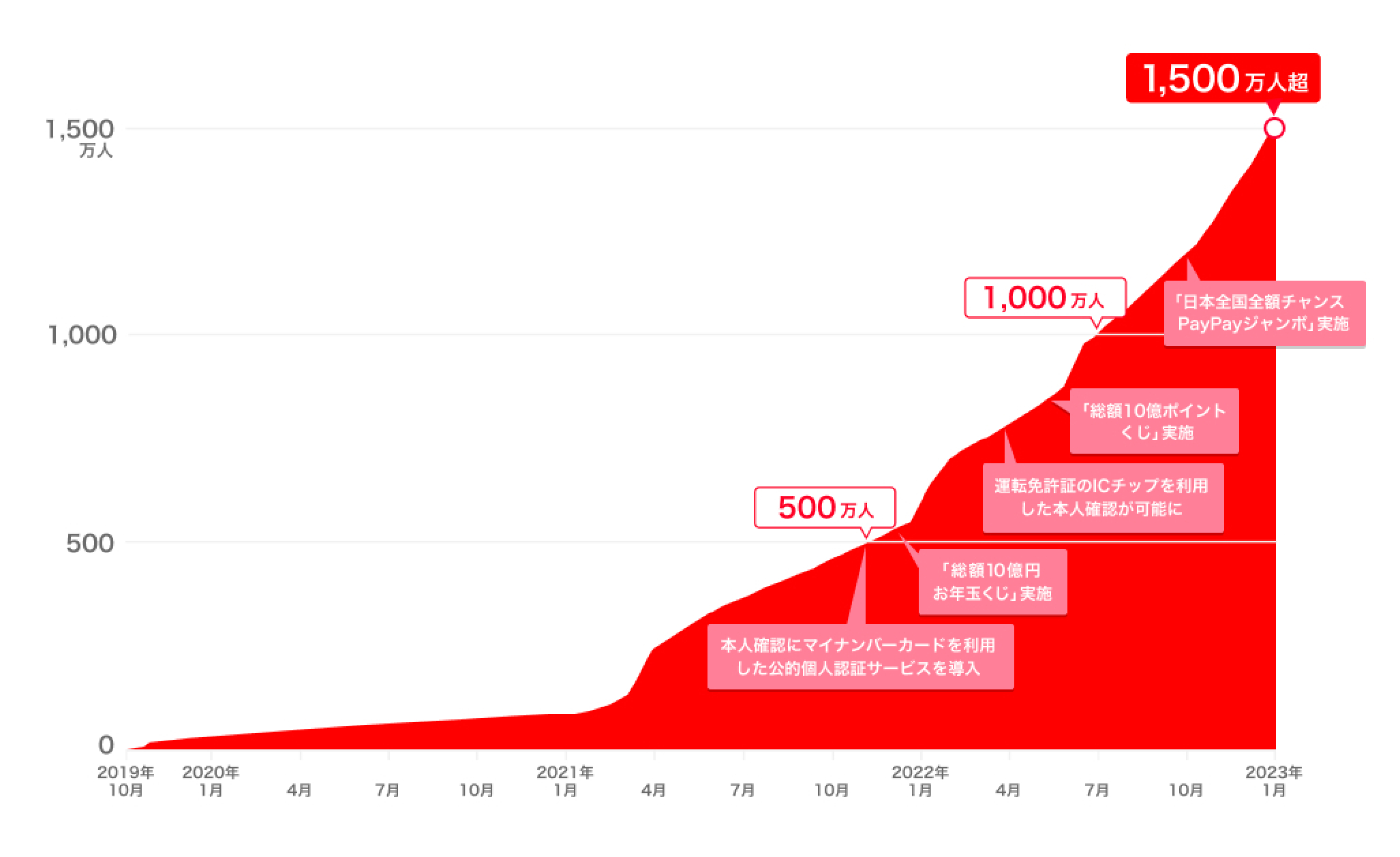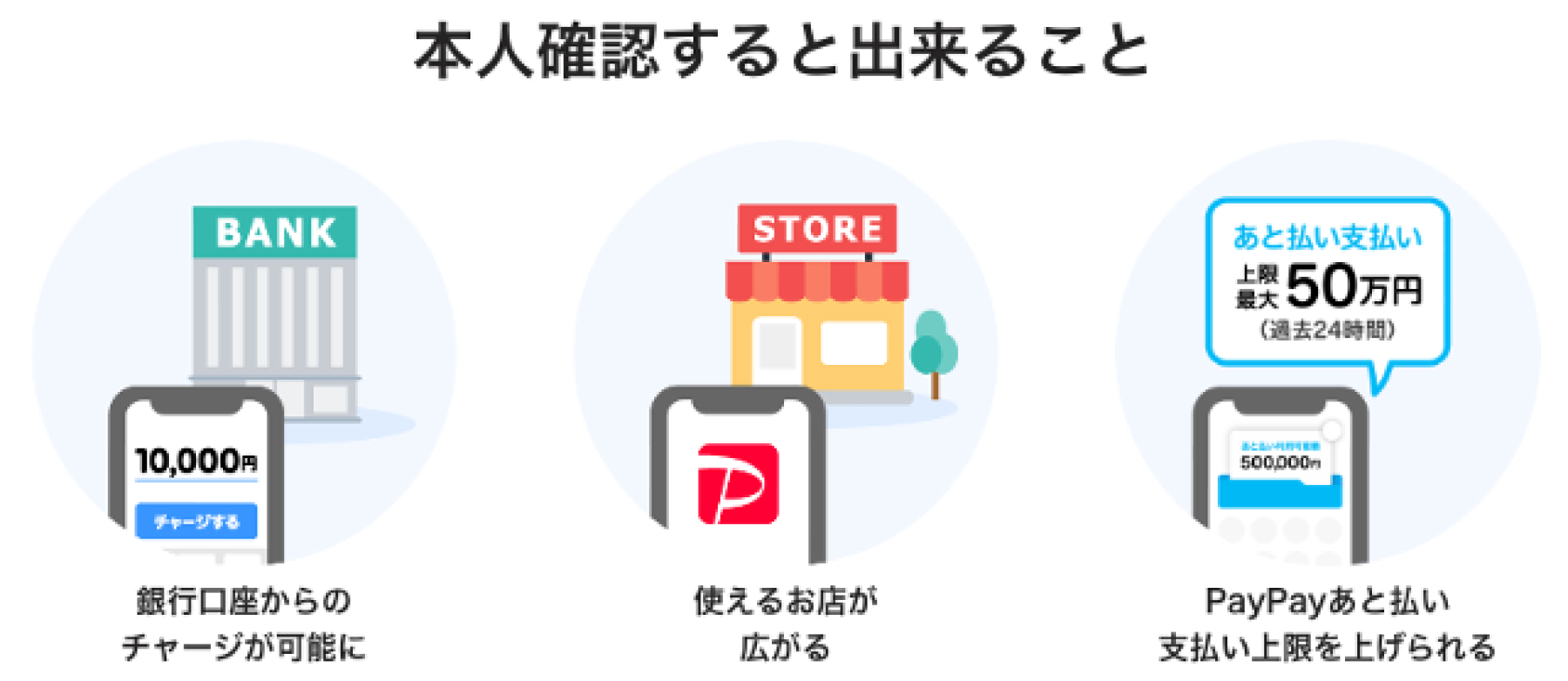PayPay Corporation is pleased to announce that the number of registered users*1 of its cashless payment service “PayPay” has reached 55 million (as of February 6, 2023). This indicates that 1 in 2.3 people in Japan*2 and 1 in 1.7 smartphone users in Japan*3 use the app, which continues to grow as a payment social infrastructure. Further, in January 2023, the number of registered PayPay users who have completed identity verification (eKYC) exceeded 15 million, an increase of 5 million in six months from the 10 million mark.


*1. Number of users who have registered a PayPay account.
*2. Calculated by PayPay based on “Population Projections – December 2022 Report” published by the Statistics Bureau of Japan.
*3. Calculated by PayPay based on “Population Projections – August 2021 Report” published by the Statics Bureau of Japan and “1. Information and Communication Devices Ownership” in “2021 Telecommunications Usage Trends Survey” published by the Ministry of Internal Affairs and Communications.
Since “PayPay” was launched in October 2018, the company has constantly improved the app’s UI and UX and expanded the services to create a super app that enhances and adds more convenience to people’s lives. The number of registered users has been steadily increasing due to the app’s increased use cases and campaigns, and thanks to tailwinds from the Point Reward Project for consumers using cashless payments and the Myna Points Project. In recent years, the company has strengthened its ties with financial services, offering services tailored to users’ needs, such as expanding the product lineup of “PayPay Insurance (1 day insurance),” which users can easily subscribe to through the PayPay app, and adding a new regular investment feature to “PayPay Invest,” a service which allows users to buy and sell securities. Moreover, by acquiring PayPay Card as a wholly owned subsidiary in October 2022, “PayPay Card” and “PayPay Card Gold” can now be used in combination with “PayPay” to earn even more PayPay Points.
These measures have resulted in the number of registered users surpassing 55 million, and in “Mobile Market 2023(※4)*4″ published by data.ai, the app was ranked second (ranked first among apps provided by private companies) in the category of most downloaded apps in 2022, following the Mynaportal app.
As the leading cashless payment services company, PayPay aims to provide even safer and more secure services, actively promoting identity verification and continuously raising the bar against money laundering and financing of terrorism to prevent the app’s misuse in criminal activities and by terrorist organizations*4. Consequently, the number of “PayPay” users who have completed identity verification (eKYC) has exceeded 15 million in January 2023. As part of this initiative, the company is regularly running campaigns, such as the “Chance to Win All Over Japan! Super PayPay Jumbo” that will start on February 15. In this campaign, users who have completed eKYC will be eligible for an additional number of lottery draws, increasing their chances of winning. Other advantages include the ability to top up to one’s PayPay Balance from a bank account*5.
In addition, identification may be required to use the convenient features of “PayPay” that are currently offered and may be needed for the advanced features and services that will be introduced in the future. For more details on the identity verification in “PayPay,” please click here.
【Benefits of completing identity verification (eKYC)】
Top up from bank accounts
Availability of PayPay Money, which can be used for paying insurance premiums and at more merchants, including Amazon.co.jp
Increased limit for PayPay Atobarai (Pay Later)

Identity verification for “PayPay” can be applied for in as little as two minutes by scanning the IC chip in a My Number Card or driver’s license, and the screening process could be completed on the same day. Of all the identity verification applications on PayPay, approximately 50%*6 are performed using JPKI (Japanese Public Key Infrastructure)*7, contributing to the effective use of the My Number Card, which the government is promoting.
*4. From “Top App Ranking by Market in 2022,” in Mobile Market 2023 published by data.ai on January 12, 2023.
*5. The amount may be lower than 500,000 yen (for the last 24-hour period) depending on registration details and usage. For more information on the limit of PayPay Atobarai, please click here.
*6. The JPKI utilizes the e-signature document logged in the My Number Card to prove the identity of a person recorded in the basic resident register.
*7. The JPKI utilizes the e-signature document logged in the My Number Card to prove the identity of a person recorded in the basic resident register.
PayPay will continue to offer the convenience of cashless payments to users as well as all kinds of retailers and service providers, with the goal of creating a world in which a safe cashless shopping experience can be enjoyed anywhere in Japan. “PayPay” will continue on the path to evolve from a “payment app” into a “super app” that will make users’ lives richer and more convenient, fostering a culture of “Anytime, Anywhere with PayPay.”
■ About “PayPay,” the cashless payment service provided by PayPay Corporation
PayPay is a cashless payment service expanding across the country, available not only at major chain stores but also at small and medium size retailers, vending machines, taxis, and even public transportation. It can also be used in a variety of other situations, including paying for online services and utility bills. PayPay is also expanding its range of services beyond just payments, including a “send/receive” feature (remittance/transfer and receiving of money) that allows users to transfer their PayPay Balance (PayPay Money and PayPay Money Lite) between each other for free, or “point management,” a service that allows users access to a simulated investment experience involving the exchange of PayPay Points with points provided by a service provider that PayPay is partnered with. The company also strives to create a safe and convenient environment for users through a hotline available 24/7 and a full compensation scheme ensuring, compensation for any damages that may be suffered.
PayPay is registered as follows:
・Prepaid Payment Instruments (third party type) Issuer, Registration #: Director-General of the Kanto Finance Bureau, No. 00710 (Registration date: October 5, 2018)
・Fund Transfer Operator, Registration #: Director-General of the Kanto Finance Bureau, No. 00068 (Registration date: September 25, 2019)
・Japan Payment Service Association (https://www.s-kessai.jp/, Date of admission: September 12, 2018)
・Business Operator that Concludes Contracts on the Handling of Credit Card Numbers, etc., Registration #: Kanto (K) No. 106 (Registration date: July 1, 2019)
・Japan Consumer Credit Association (https://www.j-credit.or.jp/, Date of admission: July 1, 2019)
・Telecommunications Carrier (Filing #: A-02-17943 / Date filed: July 2, 2019)
・Notified Person Entrusted with Intermediation (Filing #: C1907980 / Date filed: December 18, 2019)
・Bank Agency Operator, License: Director-General of the Kanto Finance Bureau, No. 396 (Registration date: November 26, 2020)
・Financial instruments intermediary service registration number: Kanto Finance Bureau Director (Kinchu) No. 942 (Registration date: June 25, 2021)
* “PayPay” provides 5 types of PayPay Balance: PayPay Money, PayPay Money Lite, PayPay Points, PayPay Bonus Lite, and PayPay Gift Voucher.
PayPay Money can be used to pay for partner services and merchants if it is within the amount deposited into the PayPay account opened after completing an identity verification process. It can also be used for sending and receiving money between PayPay users free of charge. PayPay Money can also be cashed out to a designated bank account (no withdrawal fee if using PayPay Bank). The legal nature of this is an electromagnetic record which can be used to pay for goods and other services, and can be remitted or cashed out, and is issued by PayPay who is a Fund Transfer Operator registered under Article 37 of the Payment Services Act. Based on the provisions of Article 43 of the Payment Services Act, PayPay protects the debt it owes to its users in by depositing assets equivalent to or more than the debt amount. PayPay Money Lite is an electronic money issued by PayPay, which can be purchased and used to pay for services and merchants. PayPay users can transfer and receive PayPay Money Lite free of charge. The legal nature of this is a prepaid payment instrument issued by PayPay (Article 3, Paragraph 1 of the Payment Services Act). Based on the provisions of Article 14 of the Payment Services Act, PayPay preserves the relevant assets for the purpose of protecting the owners of the prepaid payment instrument by providing a security deposit for issuance to the Legal Affairs Bureau in an amount that is half or more of the unused balance of prepaid instrument methods as of March 31 and September 30. In addition, PayPay Points and PayPay Bonus Lite, which are granted through campaigns and promotions when using PayPay, can be used for partner services and in transactions at merchants in addition to PayPay Money and PayPay Money Lite. However, PayPay Bonus and PayPay Bonus Lite cannot be sent or transferred between PayPay users or be cashed out. PayPay Bonus Lite has an expiration date, after which it will no longer be valid. PayPay Gift Voucher is a type of electronic money issued by PayPay, which can be used to make payments for affiliated services and merchants designated by the PayPay Gift Voucher. However, it cannot be transferred to other users or cashed out. PayPay Gift Vouchers are valid for six months after issuance, after which they will no longer be valid.
PayPay also strives to create a safe and secure environment for users. If an unexpected payment is made by a third party using a PayPay account, or if a request to settle a payment suddenly arrives from PayPay to a user that does not have a PayPay account, providing that certain conditions are met, the user can be compensated for the damages suffered (the difference will be provided as compensation if compensation is also provided by a third party). Please see applying for compensation for details.
*Company names, trade names, and products/services in this press release are registered trademarks or trademarks of their respective companies.





